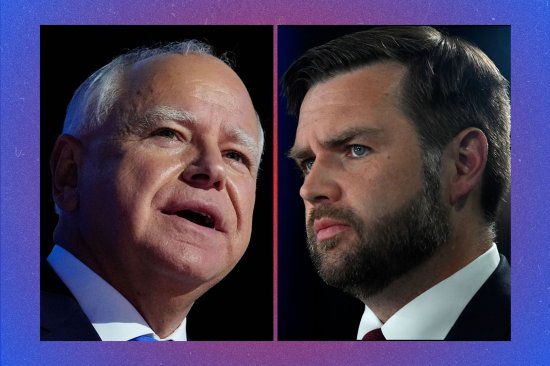
From hot mics to no studio audience, here are the rules for when J.D. Vance and Tim Walz face off in the CBS vice-presidential debate.
J.D. Vance and Tim Walz are set to face off for the first time in a vice presidential debate on Oct. 1, in what will likely be the last major debate of the 2024 election cycle.
The match-up between the Republican Ohio Senator and Democratic Minnesota Governor will feature similar rules to those for the presidential debate between former President Donald Trump and Vice President Kamala Harris, with one notable exception: each candidate’s microphone will be turned on throughout the 90-minute event instead of muted when it’s the other’s turn to speak. The other rules, such as no studio audience, remain the same.
[time-brightcove not-tgx=”true”]The debate will start at 9 p.m. ET and is being hosted by CBS News, which released the rules on Friday. It will be moderated by CBS Evening News anchor Norah O’Donnell and Face the Nation moderator Margaret Brennan.
With early voting underway and polls indicating a tight race, the debate could allow the vice presidential candidates to make a last-minute pitch to voters ahead of the Nov. 5 election.
Walz and Vance have traded barbs throughout the campaign. Walz went viral this year for calling Trump and Vance “weird” during a television interview, a remark that later became a rallying cry for Democrats. Vance has taken aim at Walz’s military history, criticizing the timing of Walz’s 2005 retirement from the Minnesota National Guard before his unit deployed to Iraq.
Here are the rules for the vice presidential debate.
Hot microphones
Unlike the presidential debates this election cycle, the candidates’ microphones will be kept on throughout the entire debate even when the other candidate is speaking, according to CBS News, which added that it “reserves the right to turn off candidate microphones.”
The issue of muted microphones became a contentious topic leading up to the recent Harris-Trump debate. The rule was originally proposed by President Joe Biden before the first presidential debate in June to curtail interruptions, but Harris sought to change the rule after Biden dropped out of the race and she secured the party’s nomination. Harris was unsuccessful, and mics remained muted for her debate against Trump.
No live audience
In line with the recent presidential debate, the Vance-Walz event will take place without a live audience in an attempt to minimize disruptions. The move marks a departure from previous vice presidential debates, which have typically featured audience members who are instructed to remain quiet while the candidates are speaking.
Standing at lecterns
Both Walz and Vance will stand at identical lecterns for the entire 90-minute debate, marking the first time since 2008 that vice presidential candidates have not been seated to debate. CBS News said that Walz will stand on the left side of the stage, while Vance will be on the right side.
Each candidate will be provided with a pen, notepad, and a bottle of water on stage. No props or pre-written notes will be allowed.
No opening statements
Like the presidential debate, there will be no opening statements. Instead, each candidate will deliver a two-minute closing statement at the conclusion of the debate. A coin toss administered by CBS News on Thursday determined the order of closing statements. Vance won the coin toss and decided to speak last during closing statements.
Read More: The Reinvention of J.D. Vance
The debate will begin with the moderators introducing the candidates, starting with the incumbent party—which means Walz will be introduced first. The moderators will then ask questions, with candidates each allotted two minutes to respond. This will be followed by one-minute rebuttals and responses to the rebuttals. CBS News said that the moderators may at their discretion give the candidates an additional minute to continue a discussion. Lights will appear in front of the candidates to alert them to their remaining speaking time.
Walz and Vance will not be permitted to ask questions of each other, and the network said that no topics or questions will be shared in advance with campaigns or candidates.
Commercial breaks
Similar to the last two debates this cycle, the CBS event will feature two commercial breaks during the 90-minute broadcast. However, campaign staff will be prohibited from interacting with their respective candidates during these intermissions, denying them the opportunity for strategic consultations or to touch up the candidates’ appearance.